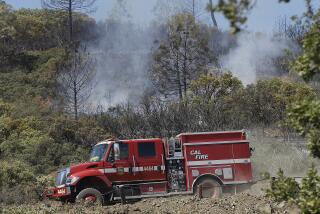Stalker Trial Lawyer Found ‘Deficient’ in ’85 Murder Case
- Share via
SAN FRANCISCO — A state Court of Appeal has found that the lawyer for accused Night Stalker suspect Richard Ramirez was professionally “deficient” in representing a San Jose man convicted of murder in another case in 1985.
But the panel, while faulting attorney Daniel V. Hernandez for inadequate preparation and legal research in the case, concluded that the lawyer’s performance was not harmful enough to the defendant to warrant a new trial.
The issue of Hernandez’s competence rose early in Ramirez’s case when Los Angeles Municipal Judge Elva R. Soper expressed concern that Hernandez, a former civil rights and labor activist, lacked the experience to represent a defendant in a capital trial involving 13 murder counts and 30 other felony charges.
Nonetheless, Soper granted Ramirez’s request to be represented by Hernandez, along with Arturo Hernandez, another San Jose lawyer who is not related.
Since then, Los Angeles Superior Court Judge Michael A. Tynan, who will preside at the trial, has given Daniel Hernandez considerable leeway in court--in the judge’s words, to “avoid any more issues of incompetence (of counsel) than are necessary.”
Prosecutors also appear to be striving to avoid a situation where a conviction eventually could be overturned because of ineffective assistance of defense counsel. For example, when the defense lagged in filing a motion seeking to suppress incriminating statements made by Ramirez, the prosecution stepped in to seek a ruling on their admissibility.
Not Surprised
Hernandez said he was not surprised by the decision but would refrain from further comment because he has not had a chance to read it.
Ramirez’s trial, after more than six months of jury selection, is scheduled to begin Monday.
In the San Jose case, Mark Anthony Headley, represented by Hernandez, was convicted of first-degree murder and sentenced to from 26 years to life in prison for the fatal stabbing of a 13-year-old boy, James Winton, in 1984.
After his conviction, Headley retained new lawyers and sought a new trial, contending that he had been denied adequate representation by Hernandez.
The trial judge, Santa Clara Superior Court Judge Lawrence F. Terry, found that while Hernandez had been an “aggressive advocate” for Headley, he was “ill-prepared” for the case.
Hernandez did not adequately interview witnesses, failed to properly subpoena witnesses, did not fully inspect the evidence and failed to adequately research the law, Terry found. Nonetheless, the judge said that because the evidence was strong and that Headley had no persuasive alibi, the conviction will be allowed to stand.
Headley’s lawyers on appeal argued that Hernandez’s performance was so deficient, that the conviction should be reversed.
“If ever a trial existed that no man should suffer through at the risk of losing his liberty, this was it,” the attorneys said in a brief filed with the Court of Appeal.
In reply, state prosecutors acknowledged that Hernandez’s efforts were “deficient in several respects” but not so “horrendous” as to warrant a retrial.
The three-member appeal panel, in a decision issued Tuesday, upheld the trial court decision in an opinion by Appellate Justice John W. Holmdahl.
The panel, applying guidelines set by the U.S. and California supreme courts, agreed that Hernandez’s representation failed to meet professional standards.
” . . . The trial court’s findings and defendant’s assertions on (Hernandez’) general lack of preparedness are supported by the record,” Holmdahl noted.
Outcome of Trial
But the panel found also that Headley had failed to show there was a “reasonable probability” that the lawyer’s performance affected the outcome of the trial. Several actions by Hernandez could be justified as acceptable trial tactics, it said. His failure to immediately object to the admission of certain evidence had no effect, because the evidence would have been admitted anyway, the panel said.
The appeal court said Hernandez’s performance was “certainly deficient” in failing to fully investigate the law in an unsuccessful effort to implicate another party in the case as the actual killer.
The trial judge repeatedly reminded Hernandez of the legal standard that had to be met to introduce such evidence and even finally provided him with the names of applicable legal precedents, the panel noted. But, “incredibly,” nine days later, Hernandez still had not read the cases the judge cited, the court said.
More to Read
Sign up for Essential California
The most important California stories and recommendations in your inbox every morning.
You may occasionally receive promotional content from the Los Angeles Times.










